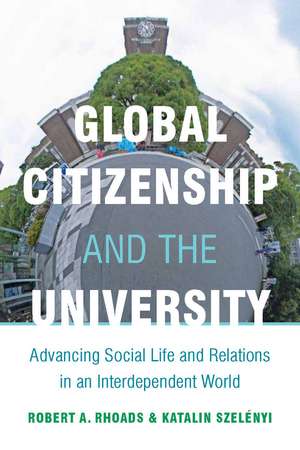Global Citizenship and the University: Advancing Social Life and Relations in an Interdependent World
Autor Robert Rhoads, Katalin Szelényien Limba Engleză Paperback – 3 mai 2011
With the increasing integration of global economies and societies, the nation-state is no longer the sole force shaping and defining citizenship. New ideas of "global citizenship" are emerging, and universities, which are increasingly involved in international engagements, provide a unique opportunity to explore how fundamental understandings of modern citizenship are changing.
Drawing on case studies of universities in China, the United States, Hungary, and Argentina, Global Citizenship and the University moves beyond a narrow political definition of citizenship to address the cultural and economic complexities of contemporary social life. Rhoads and Szelényi show how universities should be mindful of the possibilities for faculty and student involvement in the production, management, and application of knowledge, and how this in turn allows for an engagement as citizens that reflects serious considerations of the global context. Ultimately, the authors challenge universities and readers alike to consider the many transnational opportunities that are redefining citizenship today.
Drawing on case studies of universities in China, the United States, Hungary, and Argentina, Global Citizenship and the University moves beyond a narrow political definition of citizenship to address the cultural and economic complexities of contemporary social life. Rhoads and Szelényi show how universities should be mindful of the possibilities for faculty and student involvement in the production, management, and application of knowledge, and how this in turn allows for an engagement as citizens that reflects serious considerations of the global context. Ultimately, the authors challenge universities and readers alike to consider the many transnational opportunities that are redefining citizenship today.
| Toate formatele și edițiile | Preț | Express |
|---|---|---|
| Paperback (1) | 210.91 lei 3-5 săpt. | |
| Stanford University Press – 3 mai 2011 | 210.91 lei 3-5 săpt. | |
| Hardback (1) | 725.00 lei 6-8 săpt. | |
| Stanford University Press – 3 mai 2011 | 725.00 lei 6-8 săpt. |
Preț: 210.91 lei
Nou
Puncte Express: 316
Preț estimativ în valută:
40.37€ • 43.87$ • 33.93£
40.37€ • 43.87$ • 33.93£
Carte disponibilă
Livrare economică 31 martie-14 aprilie
Preluare comenzi: 021 569.72.76
Specificații
ISBN-13: 9780804775427
ISBN-10: 0804775427
Pagini: 336
Dimensiuni: 152 x 229 x 23 mm
Greutate: 0.45 kg
Editura: Stanford University Press
Colecția Stanford University Press
ISBN-10: 0804775427
Pagini: 336
Dimensiuni: 152 x 229 x 23 mm
Greutate: 0.45 kg
Editura: Stanford University Press
Colecția Stanford University Press
Recenzii
"Overall, the book is strongly structured and successfully bridges the fields of higher education and citizenship studies. It also offers an interesting and unique angle to examine various issues in the higher education arena."—Zhenzhou Zhao, Frontiers of Education in China
"Rhoads and Szelényi offer fresh insights into the politics of globalization, the role of public good and private objectives, and the position of mobile non-citizens. This vivid, thoughtful book advances arguments about the limits of territorial nationalism and the implications of those limits for globalizing universities. A path-breaking work."—Simon Marginson, University of Melbourne
"Beginning with the realization that the world has become inextricably interconnected, this excellent book—written with flair and many deep insights—seeks to understand what this might mean, and how its more democratic implications might be realized in higher education towards the formation of global citizens who are both morally informed and critically reflexive."—Fazal Rizvi, University of Melbourne, Australia
"The challenges of globalization so carefully analyzed by Rhoads and Szelényi deeply affect the nature, identity, and roles of universities. Foremost among these challenges is the question, so exquisitely analyzed through case studies and solid theorizing in this book, of how universities may deal with the dilemmas of global citizenship in the context of growing hybridization, expansive global capitalism, growing transnational political spheres, and by implication new forms of identity. These are extraordinary times, with extraordinary challenges. This book is definitely a must to read."—Carlos Alberto Torres, University of California, Los Angeles
Notă biografică
Robert A. Rhoads is Professor of Higher Education and Organizational Change and the founding Director of the Globalization and Higher Education Research Center at the University of California, Los Angeles. Katalin Szelényi is Assistant Professor of Higher Education at the University of Massachusetts Boston.
Descriere
This book examines faculty and students at four universities around the world to understand the diverse ways individuals experience and define citizenship in the age of globalization.
